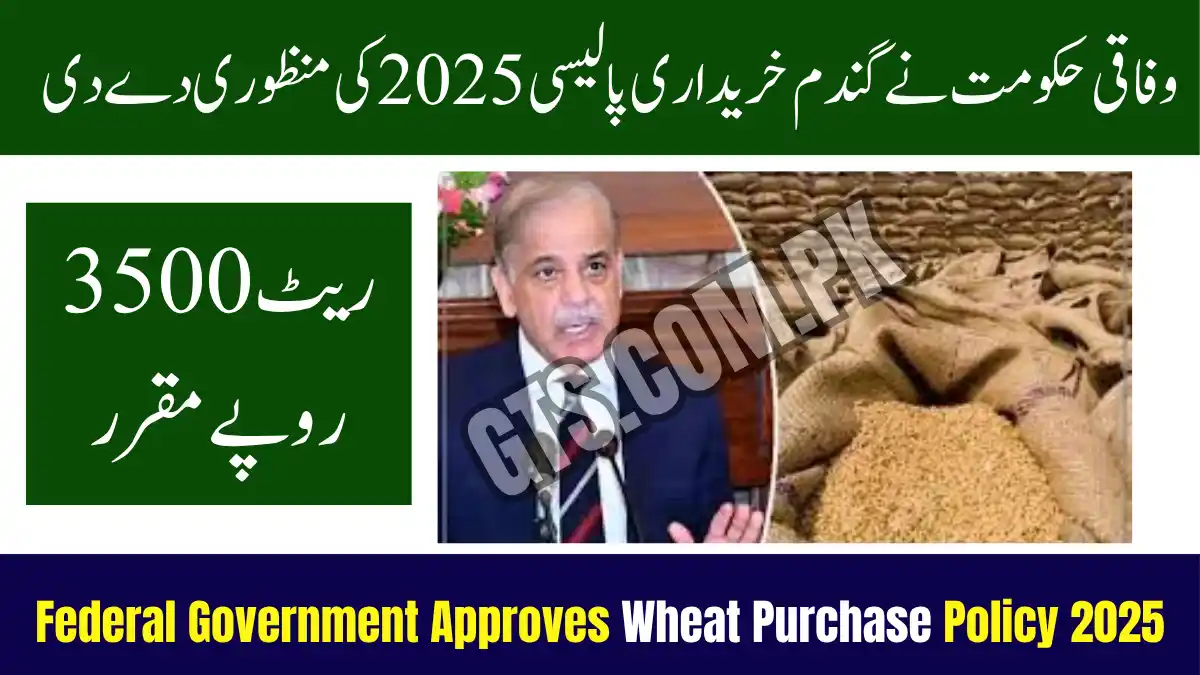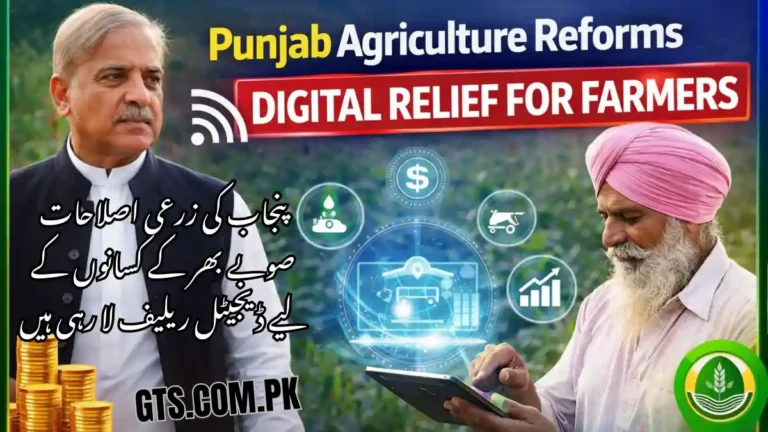Federal Government Approves Wheat Purchase Policy 2025 – Rs. 3500 Rate Fixed
The federal cabinet has officially approved the Wheat Purchase Policy 2025, fixing the support price at Rs. 3,500 per 40 kilograms, bringing clarity and stability to Pakistan’s wheat market ahead of the new procurement season. The decision marks a critical policy step aimed at ensuring fair returns for farmers, sustainable flour prices for consumers, and strategic reserves for food security.
The new Wheat Purchase Policy 2025 aligns domestic rates with international benchmarks, enabling the government to strike a balance between farmer welfare and national affordability.
Background of the Decision
Pakistan’s agriculture sector contributes nearly 19% to GDP, with wheat being the country’s most cultivated crop. For months, there had been ongoing discussions among federal and provincial stakeholders regarding the wheat procurement price 2025 Pakistan.
Farmers’ associations had been demanding an increase in the support price, citing rising input costs—fertilizer, fuel, and irrigation expenses—while the government sought to prevent inflationary pressure on food items.
After several rounds of consultations between the Ministry of National Food Security, provincial food departments, and Pakistan Agricultural Storage and Services Corporation (PASSCO), the Federal Government approved the Wheat Purchase Policy 2025 and fixed the procurement rate at Rs. 3,500 per 40 kg.

💰 Government’s Announcement and Objectives
The official statement confirms that the Government Wheat Support Price Rs. 3500 was approved by Prime Minister Shehbaz Sharif after reviewing domestic and international price trends.
Key objectives behind the Pakistan Wheat Policy 2025 announcement include:
- Ensuring fair income for farmers amid rising production costs.
- Maintaining sufficient national wheat reserves to prevent shortages.
- Reducing dependence on costly wheat imports.
- Stabilizing flour prices and ensuring food security for households.
- Encouraging early sowing and optimal yield through predictable pricing.
By setting the price at Rs. 3,500, the government seeks to provide both economic relief to farmers and inflation control for consumers.
📊 Global Context – Aligning with International Rates
According to officials, the Wheat Purchase Price in Pakistan 2025 has been designed to remain close to global wheat import parity prices, making local procurement more competitive.
Pakistan imports millions of tons of wheat annually to bridge the supply gap. The new policy aims to minimize this reliance by motivating local farmers to increase sowing.
Experts note that the Rs. 3,500 rate roughly equals USD 390 per metric ton, aligning with the average international price in Q4 2025, ensuring that the country neither overpays nor discourages local cultivation.
Read More: CM Punjab High-Tech Mechanization Wheat Combine Harvesters Program 2025

Breakdown of the Wheat Purchase Policy 2025
The newly announced Wheat Purchase Policy 2025 includes several structural reforms and administrative mechanisms for efficient implementation.
| Policy Component | Description |
|---|---|
| Support Price | Rs. 3,500 per 40 kg |
| Procurement Agencies | PASSCO, Provincial Food Departments |
| Procurement Period | April–June 2025 |
| Target Volume | 8 million metric tons nationwide |
| Inter-Provincial Coordination | Price harmonization among Punjab, Sindh, KP, and Balochistan |
| Monitoring Authority | National Food Security Committee |
| Payment System | Direct digital transfer to farmers’ bank accounts |
These steps are expected to enhance transparency and reduce corruption, ensuring every registered farmer receives full payment within 72 hours of delivery.
🚜 Farmer Reaction and Market Impact
Initial reactions from farmer unions have been largely positive. The Farmers Wheat Procurement Rate 2025 meets their expectation of a reasonable balance between rising costs and fair compensation.
Farmer representatives from Punjab and Sindh welcomed the Federal Government Approves Wheat Purchase Policy 2025, stating it will encourage early cultivation for the next season and stabilize rural incomes.
However, some groups have suggested further incentives for fertilizer and diesel subsidies to complement the new pricing framework.
Market analysts believe that fixing a uniform national rate will bring predictability to the wheat trade and help stabilize flour prices before Ramadan 2026.
🌿 Support for Provincial Procurement Drives
Following the federal announcement, provinces have begun finalizing their own procurement strategies.
- Punjab is expected to procure over 5 million metric tons, led by the Punjab Food Department.
- Sindh will focus on local farmers’ protection from private exploitation.
- Khyber Pakhtunkhwa (KP) will buy smaller quantities for flour mill supply.
- Balochistan is coordinating with the federal reserve stock to prevent cross-border smuggling.
All four provinces have been advised to align their operations with the Wheat Purchase Price in Pakistan 2025 to avoid inter-provincial market distortions.
🧑🌾 Voices from the Ground
In Okara, Multan, and Rahim Yar Khan, farmers expressed relief that the government finally provided a clear policy ahead of the sowing season. One farmer said:
“This decision gives us confidence to invest in better seeds and fertilizers. With Rs. 3,500 guaranteed, at least we know our hard work will not go in vain.”
Agricultural economists agree that such predictable wheat procurement policies reduce uncertainty and encourage better planning, ultimately increasing yields and national food self-sufficiency.
🏦 Financial and Administrative Mechanisms
The Wheat Purchase Policy 2025 introduces improved financial management systems for payments and stock management.
Key Changes Include:
- Digital Farmer Registration: Farmers must register with provincial food departments or the Kisan Card portal to receive payments.
- Direct Transfers: All payments to farmers will be made via bank transfer to ensure transparency.
- Monitoring Dashboard: Real-time monitoring will track procurement, payments, and stock levels.
- Audit Compliance: The Auditor General of Pakistan will oversee procurement accounts.
This digitization is expected to end manual cash handling and reduce delays that farmers faced in previous years.
🧮 Fiscal Impact and Budget Allocation
To implement the new Wheat Purchase Policy 2025, the federal government has allocated an estimated Rs. 250 billion for wheat procurement financing.
Out of this, Rs. 180 billion will be managed through bank loans, while the remaining will be covered through federal reserves. The policy also caps provincial borrowing to prevent excess inventory that could burden fiscal stability.
📦 Stock Targets and Reserve Management
Pakistan plans to maintain a strategic wheat reserve of around 2.5 million metric tons post-procurement to safeguard against climate shocks, import delays, or sudden supply disruptions.
This reserve will ensure:
- Continuous flour supply throughout the year.
- Timely release to flour mills to control retail prices.
- Preventing panic buying or hoarding.
The Government Wheat Support Price Rs. 3500 will act as the baseline for these reserve purchases.
🌾 Economic Benefits for the Agriculture Sector
The approval of the Wheat Purchase Policy 2025 is expected to generate multiple economic benefits for Pakistan’s agriculture and rural economy:
- Increased Farmer Income: Around 5 million wheat growers will benefit directly from fair procurement.
- Rural Employment Boost: Seasonal labor for harvesting and transport will rise.
- Reduction in Import Bill: Encouraging local production will save foreign exchange.
- Food Price Stability: Government control of stocks will curb flour inflation.
- Enhanced Credit Access: Farmers with sale records will get easier bank loans.
Read More: Punjab Govt Initiative: Wheat Purchased at 3500 Rupees per 40kg
🌍 Climate and Sustainability Concerns
Officials also emphasized the need for climate-smart agriculture practices alongside the new Wheat Purchase Price 2025 Pakistan policy. Frequent floods, droughts, and unpredictable weather patterns continue to threaten yield levels.
The government plans to collaborate with the Pakistan Meteorological Department and agriculture research centers to promote:
- Drought-tolerant wheat varieties.
- Efficient irrigation systems.
- Crop insurance for risk coverage.
This ensures long-term food security beyond seasonal procurement.
📢 Official Statement
A spokesperson from the Ministry of National Food Security said:
“The Federal Government Approves Wheat Purchase Policy 2025 to protect both farmers and consumers. With Rs. 3,500 fixed per 40kg, we aim to maintain profitability for farmers while keeping flour affordable for the public.”
He added that the Wheat Procurement Policy 2025 Pakistan will be reviewed quarterly to adjust for any global market volatility.
🔍 Monitoring and Transparency Measures
The federal government has directed PASSCO and provincial departments to maintain full transparency in operations:
- Procurement centers will display official wheat rates.
- Helpline numbers will be available for farmer complaints.
- Surprise inspections will ensure no unauthorized deductions occur.
This accountability system is a key part of the Pakistan Wheat Policy 2025 announcement.
Frequently Asked Questions (FAQs)
1. What is the new wheat procurement rate for 2025?
The government has fixed the Wheat Procurement Price 2025 Pakistan at Rs. 3,500 per 40 kg.
2. Who will procure wheat under the new policy?
The procurement will be handled by PASSCO and provincial food departments under federal supervision.
3. When will procurement begin?
Procurement will start in April 2025 and continue until stock targets are achieved.
4. How will farmers receive payments?
Payments will be made through direct bank transfers to registered farmers’ accounts.
5. How does this benefit consumers?
A stable procurement price prevents hoarding and ensures consistent flour supply at affordable rates.
Conclusion
The Wheat Purchase Policy 2025 reflects the government’s effort to secure Pakistan’s food future while protecting the backbone of its rural economy — the farmers. Setting the Government Wheat Support Price Rs. 3500 provides relief to growers facing rising costs and encourages continued investment in agriculture.
By combining modern payment systems, transparency, and international benchmarking, the Federal Government Approves Wheat Purchase Policy 2025 is a step toward long-term sustainability.
For Pakistan, this policy means greater farmer confidence, reduced import dependency, and stable flour prices for millions of households — a win for both producers and consumers.









